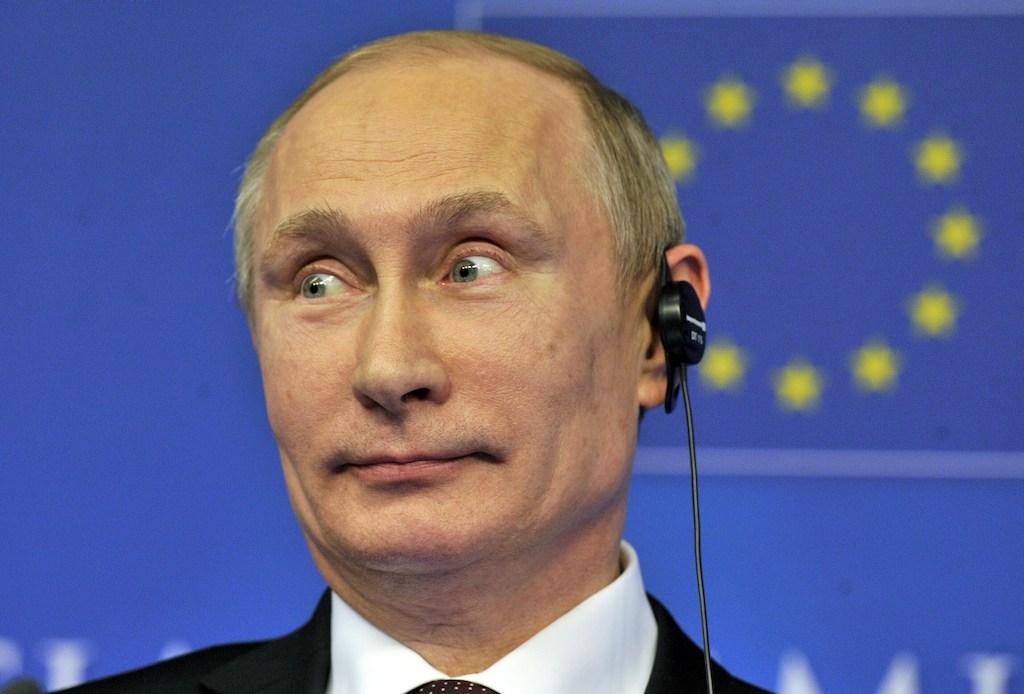The State Department channeled its inner Letterman with this Top 10 Russian lies about Ukraine list
Is this the US State Department or the "Tonight Show With David Letterman?"
Department officials got all Top-10-list on us late Wednesday, releasing a tongue-in-cheek list entitled "President Putin’s Fiction: 10 False Truths about Ukraine."
More from GlobalPost: Crimea moves to join Russia
And they didn't pull any punches.
In the intro, State Department officials wrote the world hasn’t seen "such startling Russian fiction" since Russian novelist Fyodor Dostoyevsky wrote "The formula ‘two-plus two equals five’ is not without its attractions.'"
Russia dismissed the list as a "primitive distortion of reality."
"It's clear that in Washington, as before, they are unable to accept a situation developing not according to their templates," Russian Foreign Ministry spokesman Alexander Lukashevich said in a statement.
More from GlobalPost: Crimea referendum a violation of international law, says Obama
We've pulled five of the State Department’s “Top 10 lies” from Vladimir Putin, followed by a summary of what it calls “The Facts.”
The full list can be found here.
1. Russian forces in Crimea are only acting to protect Russian military assets. It is “citizens’ defense groups,” not Russian forces, who have seized infrastructure and military facilities in Crimea.
The Facts:Strong evidence suggests that members of Russian security services are at the heart of the highly organized anti-Ukraine forces in Crimea. While these units wear uniforms without insignia, they drive vehicles with Russian military license plates and freely identify themselves as Russian security forces when asked by the international media and the Ukrainian military. Moreover, these individuals are armed with weapons not generally available to civilians.
2. Russia’s actions fall within the scope of the 1997 Friendship Treaty between Ukraine and the Russian Federation.
The Facts: The 1997 agreement requires Russia to respect Ukraine’s territorial integrity. Russia’s military actions in Ukraine, which have given them operational control of Crimea, are in clear violation of Ukraine’s territorial integrity and sovereignty.
3. The opposition failed to implement the Feb. 21 agreement with former Ukrainian President Viktor Yanukovych.
The Facts: The Feb. 21 agreement laid out a plan in which the Rada, or Parliament, would pass a bill to return Ukraine to its 2004 Constitution, thus returning the country to a constitutional system centered around its parliament. Under the terms of the agreement, Yanukovych was to sign the enacting legislation within 24 hours and bring the crisis to a peaceful conclusion. Yanukovych refused to keep his end of the bargain. Instead, he packed up his home and fled, leaving behind evidence of wide-scale corruption.
4. Ukraine’s government is legitimate. Yanukovych is still the legitimate leader of Ukraine.
The Facts: On March 4, President Putin himself acknowledged the reality that Yanukovych “has no political future.” After Yanukovych fled Ukraine, even his own Party of Regions turned against him, voting to confirm his withdrawal from office and to support the new government. Ukraine’s new government was approved by the democratically elected Ukrainian Parliament, with 371 votes – more than an 82% majority. The interim government of Ukraine is a government of the people, which will shepherd the country toward democratic elections on May 25th – elections that will allow all Ukrainians to have a voice in the future of their country.
5. There is a humanitarian crisis and hundreds of thousands are fleeing Ukraine to Russia and seeking asylum.
The Facts: To date, there is absolutely no evidence of a humanitarian crisis. Nor is there evidence of a flood of asylum-seekers fleeing Ukraine for Russia. International organizations on the ground have investigated by talking with Ukrainian border guards, who also refuted these claims. Independent journalists observing the border have also reported no such flood of refugees.
The story you just read is accessible and free to all because thousands of listeners and readers contribute to our nonprofit newsroom. We go deep to bring you the human-centered international reporting that you know you can trust. To do this work and to do it well, we rely on the support of our listeners. If you appreciated our coverage this year, if there was a story that made you pause or a song that moved you, would you consider making a gift to sustain our work through 2024 and beyond?
